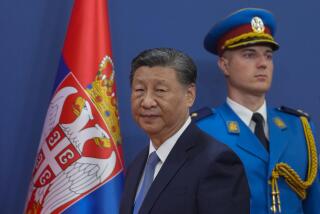China’s new party leader eschews predecessors’ rhetoric
BEIJING ‚ÄĒ No references to Marxism-Leninism or Mao Tse-tung. A speech lasting all of 16 minutes.
Xi Jinping’s debut performance Thursday as China’s new leader won him plaudits for being concise, clear and refreshingly free of the turgid Communist Party rhetoric of his predecessors.
China‚Äôs future, Xi said, requires raising the quality of life by reducing the economy‚Äôs lopsided dependence on exports. He spoke of improving housing, medical care, education and the environment. He also said the government would strive to ‚Äúmake the Chinese nation stand rock-firm in the family of nations,‚ÄĚ hinting at more assertive stances on the international stage.
Although the 59-year-old Xi is a well-known figure in China, having served the last five years as vice president, Thursday was the first time he stepped out as the party’s general secretary, a position more powerful than the presidency he will take over from Hu Jintao in March.
Given his new role, his speech drew intense scrutiny from Sinologists who will parse each word for clues to how he will steer this behemoth of a nation over the next decade.
A bear-like man with a lumbering gait, Xi affected a disarming modesty as he entered the conference room at the Great Hall of the People as head of the seven-member Politburo Standing Committee. He wore a dark suit and red tie, the same attire as the others except for one whose tie was blue. Xi smiled and apologized for being 40 minutes late.
Most notable was that the speech made no mention of Marxism-Leninism or Mao, instead emphasizing the need to improve the people’s well-being, a new buzzword in Chinese public discourse.
‚ÄúThere are many pressing problems with the party that need to be resolved, particularly corruption, being out of touch with the people, putting too much emphasis on formalities and bureaucracy,‚ÄĚ said Xi, speaking from behind a flower-decked lectern, with a dramatic landscape of the Great Wall as the backdrop.
The last barb about formality seemed aimed at Hu, who opened the party congress last week with a 100-minute work report in which he repeated slogans such as ‚Äúsocialism with Chinese characteristics‚ÄĚ (79 times) and ‚Äúscientific development‚ÄĚ (19 times).
‚ÄúI was so surprised by Xi‚Äôs speech,‚ÄĚ said He Peirong, an activist from Nanjing. ‚ÄúIt actually sounded like he cares about people and not just party.‚ÄĚ
A breezy, populist style, however, will go only so far.
Chinese leaders today rule by consensus and Xi’s fellow Standing Committee members, with the exception of Li Keqiang, the next premier, are hardly trailblazing reformers.
Zhang Dejiang earned his economics degree at North Korea’s Kim Il Sung University. Zhang Gaoli oversaw a mega-construction project in the city of Tianjin that critics say embodies China’s addiction to debt-addled construction.
Meanwhile, Wang Qishan, arguably China’s most capable economic apparatchik, is not likely to have as much say in financial policymaking because he is slated to head a commission aimed at cracking down on corruption.
In order to undertake reforms, Xi’s administration would need to take on entrenched interest groups such as state-owned enterprises and the party elites and their families who control China’s most lucrative businesses.
‚ÄúThe constraint on national leaders is pretty severe,‚ÄĚ said Kerry Brown, executive director of Sydney University‚Äôs China Studies Center. ‚ÄúIf growth is stable, they‚Äôll probably just leave things and carry on until there‚Äôs a crisis moment.‚ÄĚ
To the extent that hints about China’s direction could be gleaned from Xi’s speech, as well as from the 64-page work report with which Hu opened the party congress, it seemed that a key component would be encouraging greater consumer spending among ordinary Chinese to boost the economy.
From the pro-democracy camp, activists were disappointed that Xi did not give even lip service to easing restrictions on freedom of speech in China. In fact, the hard-line propaganda chief, Liu Yunshan, was elevated to the Standing Committee.
‚ÄúPeople get so excited because Xi talks like a normal human being and they are looking for any glimmer of hope,‚ÄĚ said Wen Yunchao, an activist from Guangzhou. ‚ÄúBut Xi didn‚Äôt say anything about reform, about democracy, about rule of law.‚ÄĚ
Zhang Lifan, a Beijing-based party historian, put it this way: ‚ÄúWhat I took away from it is that they promise to improve people‚Äôs livelihood and that‚Äôs the trade-off for the lack of democratic reform.‚ÄĚ
One advantage for Xi is that four of his Standing Committee members are in their mid-60s and will probably retire before the next party congress in 2017. Because Xi is expected to serve two five-year terms, that will allow him to pick his own team next time around.
It also helps that Hu decided not to stay on the Central Military Commission, breaking a tradition of former leaders meddling with their successors. People who know Hu say it was a point of principle for the outgoing president, who supported term limits and mandatory retirement ages to prevent another Mao figure from dominating.
‚ÄúThat was an honorable thing for Hu to do,‚ÄĚ said Robert Lawrence Kuhn, a businessman who has met and profiled many Chinese leaders. Kuhn also suggests that Xi benefits from having older, drabber figures serving with him on the Standing Committee.
‚ÄúHe is off to a good running start without people who are going to outshine him,‚ÄĚ Kuhn said. ‚ÄúAnd if he wants to promote a liberal agenda, he‚Äôll get the credit without it looking like somebody else was pulling him.‚ÄĚ
Times staff writers David Pierson and Julie Makinen contributed to this report.
More to Read
Sign up for Essential California
The most important California stories and recommendations in your inbox every morning.
You may occasionally receive promotional content from the Los Angeles Times.










